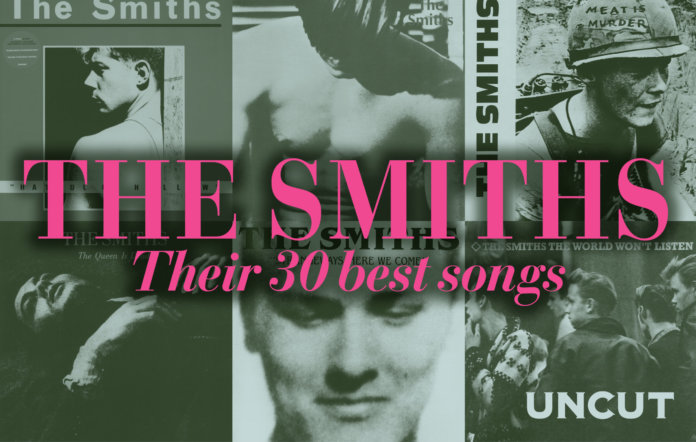5 THIS CHARMING MAN
Single (October 1983). Highest chart position: 25
This tale of punctured bathos and hillside seduction might have been at home in an Alan Bennett script, but delivered on Top Of The Pops – with Morrissey’s jubilantly pained “Ow!” – it was revolutionary.
NOEL GALLAGHER: I’ll never forget when I first heard this. I was working for a signwriting company in Levenshulme. My job consisted of using this bloody big staple gun to pin these signs together. I was working late one night on my own and it was dark, and “This Charming Man” came on the radio. I’d heard “Hand In Glove” and read an article on them in the Manchester Evening News, but the second I heard “This Charming Man” everything made sense.
I’d been a bit too young for The Jam, and they’d split up the previous Christmas just when I was really getting into them, but this was different. The Smiths were my band. The sound of that guitar intro was incredible. The lyrics are fuckin’ amazing, too. “I would go out tonight but I haven’t got a stitch to wear.” Genius. I didn’t know anything about the literary references. I just liked the spirit. People say Morrissey’s a miserable cunt, but I knew straight away what he was on about. I thought everything about him was side-splitting: the hearing aid, the lot. Maybe it’s the fact we’re both Anglo-Irish, that piss-taking thing.
I saw them on Top Of The Pops later when they did “What Difference Does It Make?”. Johnny has this white polo-neck on and the Brian Jones hair and that was it for me. I just said to myself: “I’m going to be like you!” It made me realise what I was going to do with my life.
None of my mates liked them – they were more hooligan types. They’d come into work and say “Fuckin’ hell, did you see that poof on Top Of The Pops with the bush in his back pocket?” But I thought it was life-changing.
I saw Morrissey play in Australia the other year, got all my old Smiths records out and played them all again. Hatful Of Hollow – what an album. Why don’t people make albums like that any more? It’s still one of the greatest records ever made, and it wasn’t even a proper album! How cool is that?
4 WHAT DIFFERENCE DOES IT MAKE?
Single (January 1984). Highest chart position: 12
Sturdy third single that consolidated The Smiths’ chart presence thanks to a classic, bluesy Marr riff and Morrissey’s seedy yet devout comic-book confessional.
KELE OKEREKE, BLOC PARTY: I’ve only been a Smiths fan for a short time. To me, they were always a band to avoid because of the reverence people placed on them, just like you might feel with Dylan or Led Zep.
“What Difference…” is quite obviously about someone falling in love with a friend of the same sex and that’s quite a risqué subject matter for a pop song. I guess someone’s revealed this close, dark secret to a friend and it’s all gone a bit awry, but still the character has deep emotions with this person. I think that’s such a beautiful image. Although everything’s gone wrong, the passion and desire and longing is still there.
The thing I most love about The Smiths is Morrissey’s lyricism and the way his lyrics are fully formed. They’re a celebration of the mundane and what’s actually happening in people’s lives. I think that kind of kitchen sink aesthetic was important at the time, what with so many bands adopting that exaggerated New Romantic pose. I’m not a particularly big fan of his voice or persona, but I like the fact he straddled weighty ideas with simple language. Nobody seems to give words much of a thought any more.
This song probably influenced me in the way Morrissey chronicles desire, and its ugliness and desperation. That’s definitely something that’s influenced Bloc Party. We talk about not flinching from those ugly, violent feelings that everyone in life tries to hide away from. And as a band, The Smiths have influenced how, lyrically, I try to be as honest as possible when writing words.



